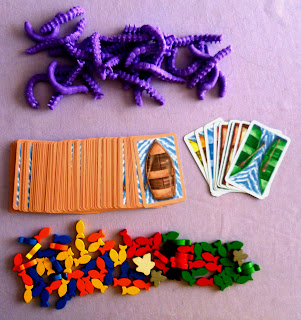I picked up a copy of If Wishes were Fishes in “The Works” recently where I think I walked in at the right time as they were selling off a number of Rio Grande and Queen Games fairly cheap, and most I had never heard of before.
 |
| Box lid showing multiple language version |
If fishes were wishes is designed by Michael Adams and Peter Sarrett, it is produced by Rio Grande Games and takes from 2-5 players aged 10 and above and plays in about 45 minutes.
The box contents consist of a playing board, depicting 7 market stalls each stall with a different type of fish and a score track going around the perimeter; 75 small wooden fish and 5 small wooden discs split into the 5 player colours; a deck of 70 fish cards and 4 “Closed market” cards; 5 wooden customer counters valued 3, 2, 2, 1 & 1; lastly 30 large rubber worms.
 |
| The Playing Board |
The Rules booklet is multilanguage (German, French & English) and easily read being 2 pages and one page of card explanations. There are a couple of ommissions though common sense will work these out (eg with each sale do you put a fish on for making a sale at the market or for each fish you sell at the market? This is not covered anywhere, we worked it out to be one for each fish sold).
 |
| Rules Booklet |
Most of the fish cards are split in two having one of the seven fish depicted upon it and the second half containing a wish, i.e. an action which the card can be used for.
 |
| Market Card, Player Start Boat, Additional Boat, four Fish Cards |
The winner of the game is the player who collects the most cash, this is generally gathered from collecting fish cards and then selling them at the appropriate market stalls, however cash bonuses can also be obtained by selling the majority of fish at a stall when it is closed or having the most worms, in addition some of the wishes give a little cash bonus. The game is all about taking the correct actions at the correct time. The set up consists of players taking their fish markers and 6 worms, placing their disc on the score track, randomly putting a customer on five of the seven stalls and dealing out 4 fish cards in a line. Each player also has 2 ethereal boats (my edition came with a card showing the 2 boats, but they are not available in all copies).
 |
| The Game Pieces |
A turn consists of taking one of three options. The first is taking a fish card from the row as a fish and placing it in your boat. Any cards you jump over in the row you must place one of your worms upon. When a card is taken all cards move down and a new one placed at the end, any worms on a card when taken go into the takers stock.
 |
| The worms (they are fun to play with on their own) |
The second option is to sell a fish that you already have in a boat at a market stall, in such a case the value of any customers there is added to the stalls base value of 2, the card is then discarded, cash added to the points track and a fish placed on the stall. If after a sale a stall contains as many fish markers as is shown on the next closed market card, that stall is closed and bonus points given for first and second placed majorities. More fish can be sold at the stall, but they are placed on the rubbish tip. The game ends when either ten fish are on the rubbish tip or 4 stalls become closed.
 |
| Customers in various sizes |
The third option is to take a fish card but use the action part of it, actions can only be taken from the card row and worms must be paid for each card you pass over. There are many actions which involve moving customers, selling multiple fish, collecting cash for worm holdings, throwing someone’s fish on the rubbish tip, creating another boat and selling one type of fish as another. It is the use of actions at the right time which will win you the game, choosing when to take fish, when to sell and when to pay out worms for the right card.
 |
| Close up of Fishes |
The game plays very smoothly, I have played it several times 2 player and a couple of times with 4. No matter how many players it has always been a tight contest with no fixed strategy. In one game I paid out worms to get more boats, in another game I decided to hoard worms instead of chasing the extra boats. Both strategies won, what was key to both successes was getting in multiple sales, so fish stock management in your boats is crucial. This is a good game, light enough to interest non-gamers and strategic enough to entertain the thinkers and at £8 well worth the money.